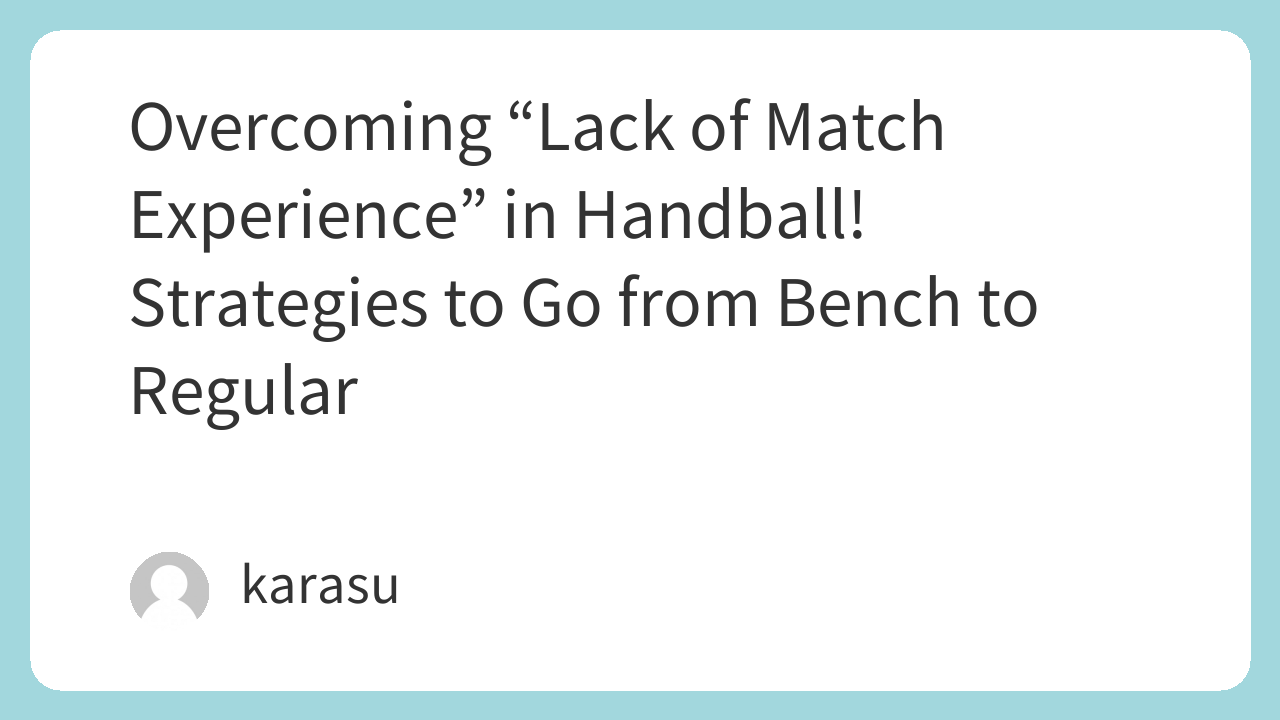Do you feel passionate about handball but find that you “have limited opportunities to play in matches” or “lack match experience”? Perhaps you perform well in practice but find your body doesn’t move as expected, or your decision-making is slow when it comes to actual games.
However, there’s no need to worry. Even with limited match experience, there are strategies to steadily improve your practical skills and seize your next opportunity. This blog post will thoroughly explain what you can and should do now to climb from the bench to a regular spot.
Why is “Match Experience” Crucial?
No matter how much you refine your skills in practice, there’s “something” you can only gain from actual matches. This is known as “game sense.”
- Instant Decision-Making and Situational Awareness: A match is a constantly evolving entity. The ability to quickly assess various factors—opponent movements, teammates’ positions, time remaining, score difference—and make the optimal play can only be developed through real-game situations.
- Handling Pressure: The mental fortitude to perform your best under the unique tension and pressure of a match, distinct from practice, can only be built by gaining experience.
- Applying Skills in Practice: Even the shooting and passing skills you acquire in practice need to be learned how to be used effectively under the pressure of opponent defense and the fast pace of a game.
- Deepening Team Chemistry: Team coordination can only truly deepen through actual match experience. Non-verbal communication like eye contact, verbal cues, and anticipating each other’s movements are refined in live play.
- Clarifying Weaknesses: Playing in matches makes your strengths and, conversely, areas where you fall short much clearer. This information is crucial for setting goals for subsequent practices.
How to Improve Practical Skills Even with Limited Match Opportunities
It’s frustrating to be in a situation where you can’t play, but let’s view this period as an opportunity to steadily grow without wasting time.
1. Maximize the Quality of Your Practice
It’s vital to make limited practice time into “time directly connected to matches.”
- Approach Practice with a “Game Mindset”: Instead of just going through the motions, perform every pass, shot, and defensive movement with the awareness that you will “use this in an actual game.”
- Points to Emphasize in Game-Simulated Drills:
- Verbal Communication: Constantly communicate with teammates to clearly indicate defensive or offensive intentions. Simple but effective shouts like “Defense!”, “Cut!”, “Shoot!” enhance team coordination.
- Movement Confirmation: For set plays like pass-and-run or screen plays, focus on perfectly replicating them against opponents, ensuring the team’s planned movements are executed seamlessly.
- Practice Under Pressure: Ask your coach or teammates to apply pressure during shooting or passing drills, simulating actual defensive situations. This allows you to hone your skills under conditions similar to game tension.
2. Develop Your “Observational Skills”
Even if you can’t play, “watching” games is an extremely effective learning method.
- Analysis from the Bench: When you’re not playing, become the “best spectator.”
- Analyze the Opposing Team: Carefully observe the opponent’s strong plays, weaker players, and defensive gaps. Think about how you would attack or defend if you were playing.
- Analyze Your Own Team: Learn from your teammates’ good plays, analyzing why they succeeded. If you spot areas for improvement, use them as hints for future development.
- Understand the Coach’s Intent: During timeouts or substitutions, try to understand what the coach is instructing and their underlying intentions.
- Learn from Top-Level Matches (Videos, etc.):
- Repeatedly watch videos of professional leagues and international tournaments. Analyze top players’ shooting timing, fakes, defensive positioning, and tactics in detail, looking for points you can incorporate into your own game.
- By constantly simulating “what would I do?” while watching, you can develop game sense that cannot be gained solely from theoretical study.
3. Off-Court Preparation
Effort outside the court is also crucial for seizing opportunities to play in matches.
- Physical Training: Continuously engage in strength training, endurance training, and flexibility training to build a body that’s always ready to play. If your body is prepared, you can perform well even with sudden playing opportunities.
- Mental Training:
- Visualization: Confidently imagine yourself performing well in a game, overcoming difficult situations. This can boost your self-belief and enhance your performance in actual matches.
- Goal Setting: Clearly define short-term goals (e.g., “be the best in X drill”) and long-term goals (e.g., “play in X match”) to maintain motivation as you work towards them.
- Deep Understanding of Rules and Tactics: Beyond the rules of handball, deeply understanding your team’s tactics and the opponent’s preferred strategies will allow you to play smoothly when you get the chance and move according to the coach’s intentions.
Conclusion: Continuous Action Opens the Door to Your Next Opportunity
The situation of lacking match experience can certainly be frustrating. However, how much preparation you put in during this period will determine the future of your handball journey.
Don’t rush, but diligently do everything you can now, and never neglect “preparing to play in a match at any time.” Your efforts will surely catch the coach’s eye and lead to brilliant plays in games.
I support your passion for handball as you face your challenges and continue your steady efforts.



コメント